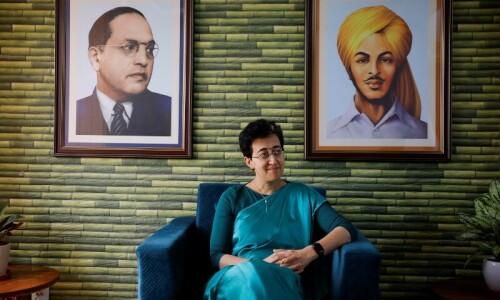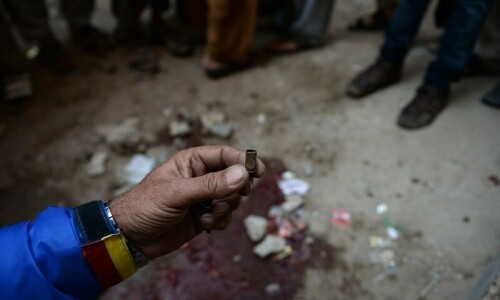WASHINGTON: The US presidential race heated up on Sunday after White House hopeful Senator Hillary Clinton clashed with rival Barack Obama over how the Democratic Party should choose its presidential nominee.
Trailing Obama in the nomination race after losing eight straight contests to the Illinois senator, Clinton and her advisers suggested hundreds of superdelegates — party activists and elected lawmakers attending the Democratic convention in August — were not bound by the results of voting in their states, US media reported.
“Superdelegates are a part of the process,” Clinton was quoted as saying.
“They are supposed to exercise independent judgment,” Clinton said on Saturday while campaigning in Wisconsin, which holds primaries on Tuesday.
But Craig Holman, a lobbyist for the organisation Public Citizen, expressed a different point of view.
“It’s anti-democratic,” he said. “It’s specifically designed for the purpose of having the insiders ... have some sort of final decision over who the nominee is going to be, regardless of what the voters want.” Clinton and her advisers made clear their view that the 795 unelected superdelegates could clinch the nomination for her even if Obama prevails among voters in primaries and caucuses.
Obama, who has won the popular vote so far, has argued that superdelegates should back the candidate who wins the most delegates based on primaries and caucuses in states across the country.
He now has a slight lead in pledged delegates after a string of victories and hopes to extend his winning streak in Wisconsin and in caucuses in Hawaii on Tuesday.
But senior Clinton aide Harold Ickes told reporters the superdelegates should exercise “their best judgment in the interests of the party and the country.” Ickes predicted that after all primaries are concluded on June 7, “she (Clinton) will be neck and neck with Mr Obama ... Then she will wrap up the nomination.” Ickes also argued the results of delegates from Michigan and Florida should count even though the candidates agreed not to campaign in those states. The national Democratic Party stripped the two states of delegates after they flouted party rules and moved up the date of their primaries.
Obama’s campaign promptly shot back, accusing Clinton of planning to undermine the popular will of Democratic voters.
“The Clinton campaign should focus on winning pledged delegates as a result of elections, not these say or do anything to win tactics that could undermine Democrats’ ability to win the general election,” said Obama campaign manager David Plouffe in an email.
The feud over how to select the Democrats’ presidential candidate for the 2008 election came as Clinton struggled to regain the initiative amid gathering momentum for Obama, who also now has the edge in campaign funds.
Both candidates campaigned in Wisconsin to woo the Midwestern state’s mainly white, working class electorate, which has shaped the outcome of previous Democratic nomination fights.
Obama and the former first lady traded attacks over their voting records and platforms on Saturday, with Clinton painting the silver-tongued Obama as lacking substance while he portrayed the New York senator as hamstrung by Washington’s partisan ways.Two polls gave Obama a four-point lead in Wisconsin, which has 74 delegates at stake. Hawaii, with 20 delegates in play, also holds caucuses Tuesday with Obama — a native son who was born and raised there —favoured to win.
Obama has 1,296 delegates so far, compared to 1,238 for Clinton, according to independent website RealClearPolitics. At least 2,025 delegates are needed to win the Democratic nomination at the convention in Denver in August.
With the race so tight, the superdelegates have taken on crucial importance amid concerns the nomination fight could spark a damaging row inside the Democratic Party.
Clinton, once the dominant front-runner, is counting on delegate-rich Ohio and Texas on March 4 to halt Obama’s surge.
In the Republican race meanwhile, the Wisconsin contest could bring front-runner John McCain one step closer to the 1,191 delegates he needs to secure the party’s presidential nomination. McCain has taken big strides toward becoming the Republican nominee, with 825 delegates in hand. However, he faces the challenge of winning over more socially conservative Republicans who oppose him.—AFP














































Dear visitor, the comments section is undergoing an overhaul and will return soon.